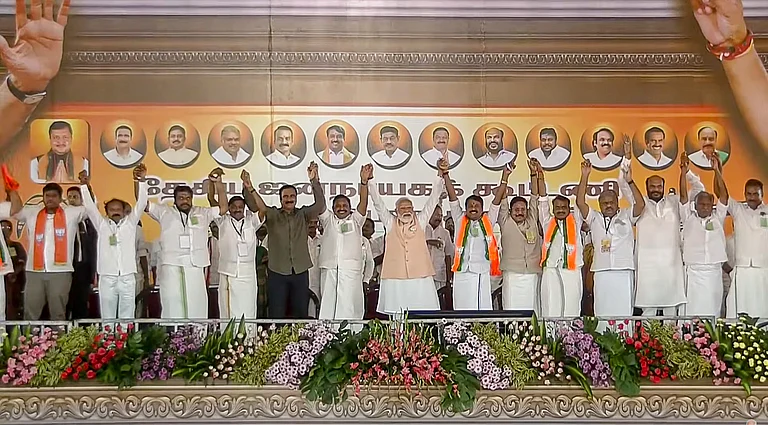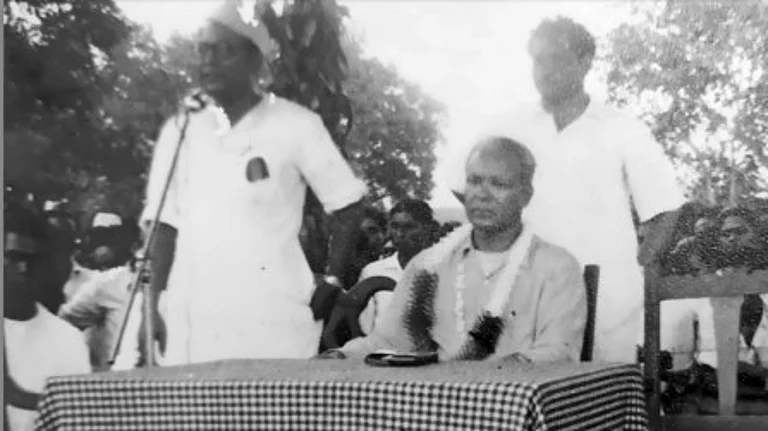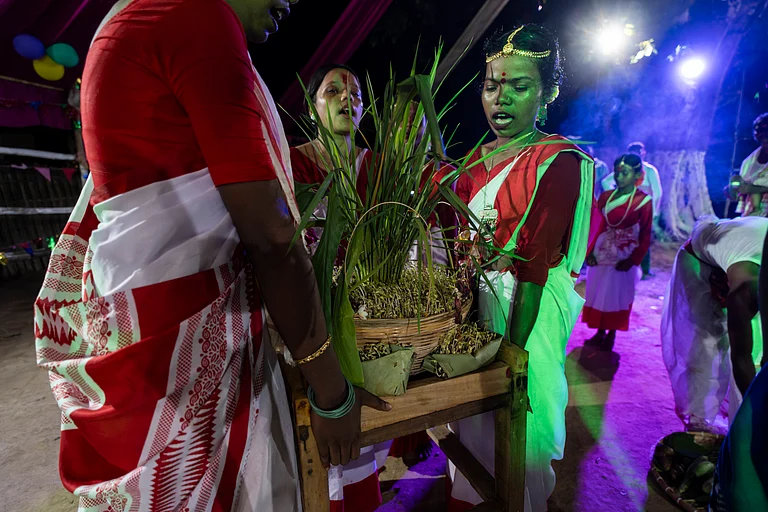On September 24, Union Agriculture Minister and former Chief Minister of Madhya Pradesh Shivraj Singh Chauhan, while addressing a rally in Baharagora in Kolhan division of Jharkhand, said that the National Register of Citizens (NRC) would be implemented in the state if BJP comes to power. He also added that the NRC would prohibit the ‘Bangladeshi infiltrators’ from getting Aadhar cards and enrolling on the voter list.
This is not the first time in the recent past that the party has evoked the ‘fear’ of infiltrators. Around a week earlier, addressing a rally at Sahebgunj, Union Home Minister Amit Shah said “Infiltrators are the vote bank of Lalu Prasad’s RJD, Rahul baba’s Congress and Hemant Soren’s JMM. I promise to drive out illegal immigrants. The time has come to show the corrupt JMM dispensation the exit door…We want to change Jharkhand.” Marking "rampant infiltration" as one of the major issues of the state, he also said that illegal immigrants would become majority in the state within 25-30 years. The newly installed Bangladesh government has criticised Shah’s statement and, in a note, expressed its “reservation, deep sense of hurt and extreme displeasure”.
For the last few months, since Assam CM Hemant Biswa Sarma and Union Minister Chouhan were recruited as the BJP’s in-charge for the upcoming elections, there have been several occasions when the question of ‘Bangladeshi infiltrators’ came up. Earlier, Jharkhand Home Secretary Vandana Dadel wrote a letter to the Election Commission pointing out how the two BJP leaders were allegedly fomenting communal discord through their "inciteful" statements.
Sarma has brought up the issues of ‘love jihad’ and ‘land jihad’, accusing Muslim men of marrying Adivasi women to grab their lands. The allegations are mostly centred on two districts--Pakur and Sahebgunj--both having more than 31 per cent Muslim population according to 2011 census.
The civil society reports, however, negate these claims. A team of Jharkhand Janadhikar Mahasabha and Loktantra Bachao Abhiyan, when visiting Pakur and Sahebgunj to check the facts on the ground, found most of the reported clashes between Adivasis and Muslims were actually local issues. In Gaithbathan village, a land dispute between a Muslim and an Adivasi family has been going on for more than 30 years. On July 18, a scuffle broke out between these two families and on July 27, students of KKM college from Adivasi Chhatra Sangh protested against it.
According to their reports, at Taranagar-Ilami, Hindu families beat up a Muslim youth and his mother for allegedly sharing a photo of a Hindu girl on social media. A large number of Muslims vandalised and attacked the Hindu hamlet after the rumour of the death of the Muslim woman spread. Though the fact-finding team members, after talking to victims and the villagers, came to the conclusion that there was no Bangladeshi who had fomented the violence, BJP leader from Jharkhand Nishikant Dubey put the onus on ‘infiltrators’.
Siraj Dutta, who was part of the team, says, “All of the incidents regarding the Bangladeshi infiltrators are actually local issues. We visited the villages and asked them whether they ever knew of the Bangladesh infiltrators. Most of them said that they got to know it from social media.”
Muslims in this region are Bangla Bhashi, not Bangladeshi. Some of them have been staying in this Santhal Pargana region since Sher Shah’s time, while others have come from West Bengal, Bihar, and other places. The central government has told the High Court that there are no Bangladeshis. The Election commission even formed a committee and mentioned that there are no Bangladeshis there. It is just a political issue, Dutta adds.
The history of Adivasi and Muslim relationship is almost 800 years old, writes former Bihar Governor R R Diwakar in Bihar Through Ages. They got mixed with the early tribal residents and as per Father Hoffman, a German Jesuit Linguist, the transactions resulted in the borrowing and amalgamation of different Arabian and Persian words in Munda dialects.
But this historical closeness of these two communities didn’t bar the BJP from allegedly provoking a fight, think the activists. “There is no Bangladeshi; rather, one can find the Bangladeshi Hindu infiltrators who have acquired 2500 bighas of land near the river. The government in its submission to the court though have said multiple times that Bangladeshi infiltrators are coming from West Bengal to Pakur and Sahebgunj--the adjacent districts of Bengal, there is no data,” says Shamim S Ali, a Jharkhand-based Muslim activists.
Another major argument that the BJP has been banking on for decades is the declining population of Adivasis in the Santhal Pargana region. They are also claiming that the percentage of Adivasi population has decreased in contrast to 1951 census. However, the ground reality is different, says Ali.
According to 1951 census, total population of Santhal Pargana was 23.22 lakhs, of which 90.37 per cent was Hindus, 9.43 per cent Muslims and 0.18 per cent Christians.
“It has been said that in 2011, the percentage of Hindus has been reduced to 67.95 per cent. But in 2011, what they didn’t consider is that the Adivasis registered their names under columns of Sarna or Others. If one removes the Adivasis from the list of Hindus in the 1951 census, one can easily find that the percentage of Adivasis has not reduced the way it is being portrayed,” Ali adds. The number of Adivasis, if one goes by that argument, increased by 8.7 lakhs, while that of Hindus and Muslims increased by 24 lakhs and 13.6 lakhs respectively since 1951.
The reports of the fact-finding committee, however, cites three factors that work behind such abysmal growth in tribal population when compared to others. Firstly, for decades, the population growth rate among Adivasis has been lower than non-Adivasi groups due to inadequate nutrition, insufficient healthcare, and economic hardship. Secondly, in the Santhal Pargana region, Muslims and Hindus from Jharkhand, Bengal, and Bihar have immigrated, purchasing land from the Adivasis. Lastly, Adivasis across the state, including in Santhal Pargana, have been forced to migrate in large numbers for decades, which directly affects their population growth rate.
The forced migration is even tied to illegal land transfer, says Dutta. There is widespread violation of the Santhal Pargana Tenancy Act according to which Adivasis cannot sell their lands to non-indigenous communities. “Due to several reasons--mostly the miserable economic condition--they are forced to illegally sell their lands,” he adds.
Adivasi activists note the BJP’s ploy to communalise the environment just before assembly elections. Adivasi scholar and activist A K Pankaj says, “Historically, Jharkhand has been an anti-BJP and anti-RSS state. This time, they didn’t even win a single Adivasi reserved seat in the Lok Sabha. They found that their efforts to foment communal sentiments among the Adivasis and Christians miserably failed, so they are now trying to pit Adivasis against the Muslims.”
The troubles in JMM after Sita Soren and Champai Soren left the party would not affect the electoral scenario, say JMM leaders. “When all of these efforts (of allegedly breaking the party and the family) went astray, they started playing these ‘infiltrators’ game. If objectively read, everybody except Adivasis are infiltrators in these lands. Consecutive governments settled them here,” adds Pankaj.
In a social media post, Sita Soren said if BJP government comes to power the first step would be "to selectively throw out the Bangladeshi intruders".
Will the Adivasi-Muslim issue become a central plank in the upcoming assembly elections?



























